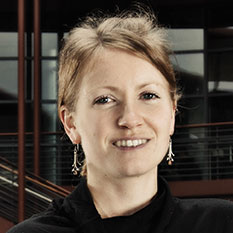Forget holding the line.
Forget holding the line. Ai-jen Poo finds opportunities to advance new social causes in the face of political adversity. She’ll deliver a keynote address at Medicine X 2017.
Ai-jen Poo has reason to feel discouraged. Causes she has doggedly championed — basic labor protections for nannies, housekeepers and home health workers and, more recently, long-term care programs for aging Baby Boomers — have come under attack in Washington.
But on a recent summer afternoon, at home in Chicago, Poo was ecstatic. More than 4,000 miles away, the governor of Hawaii was about to sign the country’s first law providing support to families caring for aging relatives. The non-profit that Poo co-directs, Caring Across Generations, had been instrumental in marshaling support for the legislation, which provides up to $70 a day to full-time workers with ill or disabled family members at home.
But for Ai-jen, the bill’s passage represented more than just progress on a specific agenda. It reinforced a belief she’s long held on organizing, generally: that activists need to do more than resist.
Now, precisely because the federal political landscape is challenging, Poo would like to see cities and states “double down” to expand health care benefits, protect immigrants and build out services for the poor.
“The best defense is a good offense,” Poo says.
Grassroots activism has long been part of Ai-jen’s DNA. The daughter of progressive Taiwanese immigrants, she began organizing domestic workers in New York shortly after graduating from Columbia University in 1996.
In 2000, she founded Domestic Workers United, which she led until 2009. As the director of the National Domestic Workers Alliance since 2010, she has played a central role in raising awareness of the economy’s “most visible invisible workforce,” including helping to enact domestic worker rights in seven states. And in 2012, she was named to Time magazine’s annual list of “The World’s 100 Most Influential People.”
Today, Poo is on a mission to transform long-term care in the United States as an organizer and author.
People who work as full-time caregivers to the elderly earn on average just $15,000 a year, she says. And among families who don’t have outside support, full-time workers spend an additional 20 hours a week caring for an ailing relative.
“There is not a single person in this country who doesn’t need care for their kids, their parents, their grandparents or for themselves,” says Poo, who won a MacArthur genius award in 2014 and is using the $600,000 that comes with it to fund fellowships for caregivers-turned-activists. “Our ability to take care of our families is going to be at the center of our political conversation going forward.”
Galvanized by the passage of Hawaii’s Kupuna Caregivers Act, Poo offers a message of empowerment to citizen activists, present and future:
- National movements often kick off at the local level — and aren’t all that different from starting a book club, study group or neighborhood association. Find and bring together people who are in similar situations, then talk about how everyone could work toward a common goal.
- Never underestimate the power of personal storytelling. Real, lived experiences can create powerful visions for the future.
- Listening is just as important as sharing. Don’t assume what others need or are experiencing. Perceived differences can turn into common ground.
Anyone can make history. All it takes is coming together and formulating a plan. Just remember, says Poo: “Progress is possible under any and all circumstances — no matter how difficult the political environment is.”
Register here to hear Ai-jen Poo speak at Medicine X 2017.
Photo courtesy of the John D. & Catherine T. MacArthur Foundation.





